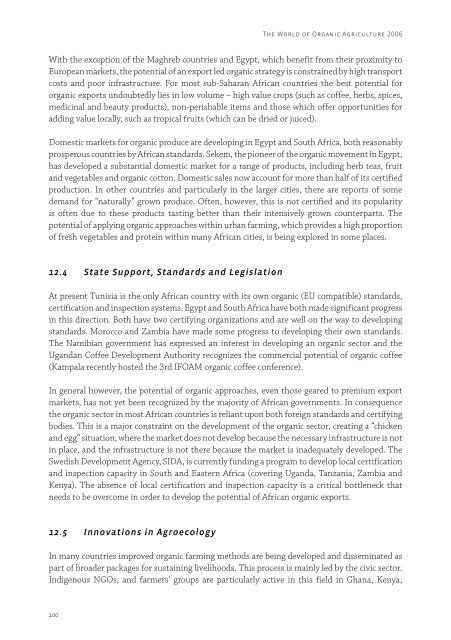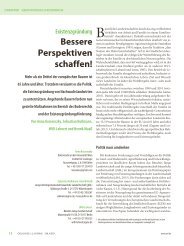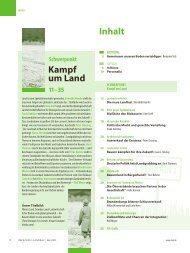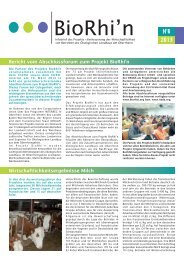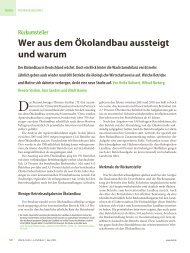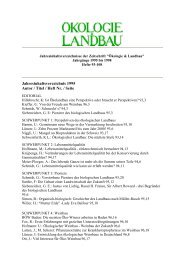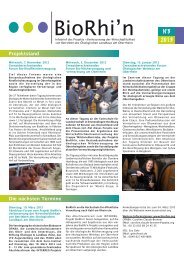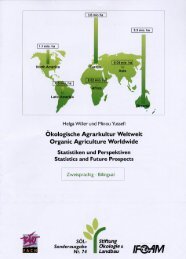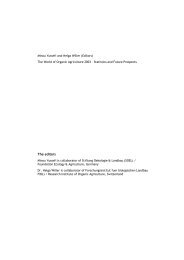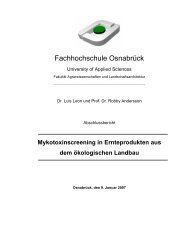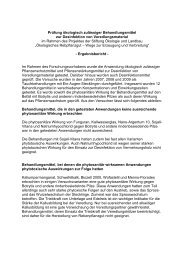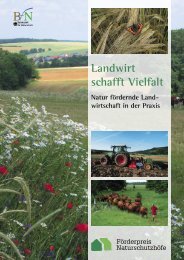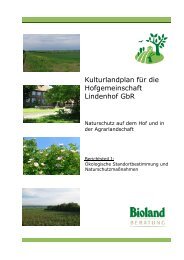the world of organic agriculture - Organic Eprints
the world of organic agriculture - Organic Eprints
the world of organic agriculture - Organic Eprints
You also want an ePaper? Increase the reach of your titles
YUMPU automatically turns print PDFs into web optimized ePapers that Google loves.
100<br />
The World <strong>of</strong> <strong>Organic</strong> Agriculture 2006<br />
With <strong>the</strong> exception <strong>of</strong> <strong>the</strong> Maghreb countries and Egypt, which benefit from <strong>the</strong>ir proximity to<br />
European markets, <strong>the</strong> potential <strong>of</strong> an export led <strong>organic</strong> strategy is constrained by high transport<br />
costs and poor infrastructure. For most sub-Saharan African countries <strong>the</strong> best potential for<br />
<strong>organic</strong> exports undoubtedly lies in low volume – high value crops (such as c<strong>of</strong>fee, herbs, spices,<br />
medicinal and beauty products), non-perishable items and those which <strong>of</strong>fer opportunities for<br />
adding value locally, such as tropical fruits (which can be dried or juiced).<br />
Domestic markets for <strong>organic</strong> produce are developing in Egypt and South Africa, both reasonably<br />
prosperous countries by African standards. Sekem, <strong>the</strong> pioneer <strong>of</strong> <strong>the</strong> <strong>organic</strong> movement in Egypt,<br />
has developed a substantial domestic market for a range <strong>of</strong> products, including herb teas, fruit<br />
and vegetables and <strong>organic</strong> cotton. Domestic sales now account for more than half <strong>of</strong> its certified<br />
production. In o<strong>the</strong>r countries and particularly in <strong>the</strong> larger cities, <strong>the</strong>re are reports <strong>of</strong> some<br />
demand for “naturally” grown produce. Often, however, this is not certified and its popularity<br />
is <strong>of</strong>ten due to <strong>the</strong>se products tasting better than <strong>the</strong>ir intensively grown counterparts. The<br />
potential <strong>of</strong> applying <strong>organic</strong> approaches within urban farming, which provides a high proportion<br />
<strong>of</strong> fresh vegetables and protein within many African cities, is being explored in some places.<br />
12.4 State Support, Standards and Legislation<br />
At present Tunisia is <strong>the</strong> only African country with its own <strong>organic</strong> (EU compatible) standards,<br />
certification and inspection systems. Egypt and South Africa have both made significant progress<br />
in this direction. Both have two certifying organizations and are well on <strong>the</strong> way to developing<br />
standards. Morocco and Zambia have made some progress to developing <strong>the</strong>ir own standards.<br />
The Namibian government has expressed an interest in developing an <strong>organic</strong> sector and <strong>the</strong><br />
Ugandan C<strong>of</strong>fee Development Authority recognizes <strong>the</strong> commercial potential <strong>of</strong> <strong>organic</strong> c<strong>of</strong>fee<br />
(Kampala recently hosted <strong>the</strong> 3rd IFOAM <strong>organic</strong> c<strong>of</strong>fee conference).<br />
In general however, <strong>the</strong> potential <strong>of</strong> <strong>organic</strong> approaches, even those geared to premium export<br />
markets, has not yet been recognized by <strong>the</strong> majority <strong>of</strong> African governments. In consequence<br />
<strong>the</strong> <strong>organic</strong> sector in most African countries is reliant upon both foreign standards and certifying<br />
bodies. This is a major constraint on <strong>the</strong> development <strong>of</strong> <strong>the</strong> <strong>organic</strong> sector, creating a “chicken<br />
and egg” situation, where <strong>the</strong> market does not develop because <strong>the</strong> necessary infrastructure is not<br />
in place, and <strong>the</strong> infrastructure is not <strong>the</strong>re because <strong>the</strong> market is inadequately developed. The<br />
Swedish Development Agency, SIDA, is currently funding a program to develop local certification<br />
and inspection capacity in South and Eastern Africa (covering Uganda, Tanzania, Zambia and<br />
Kenya). The absence <strong>of</strong> local certification and inspection capacity is a critical bottleneck that<br />
needs to be overcome in order to develop <strong>the</strong> potential <strong>of</strong> African <strong>organic</strong> exports.<br />
12.5 Innovations in Agroecology<br />
In many countries improved <strong>organic</strong> farming methods are being developed and disseminated as<br />
part <strong>of</strong> broader packages for sustaining livelihoods. This process is mainly led by <strong>the</strong> civic sector.<br />
Indigenous NGOs, and farmers‘ groups are particularly active in this field in Ghana, Kenya,


